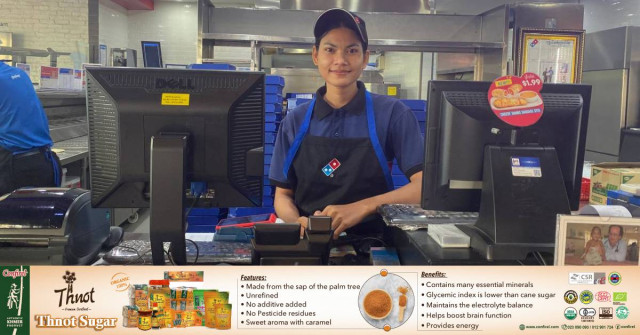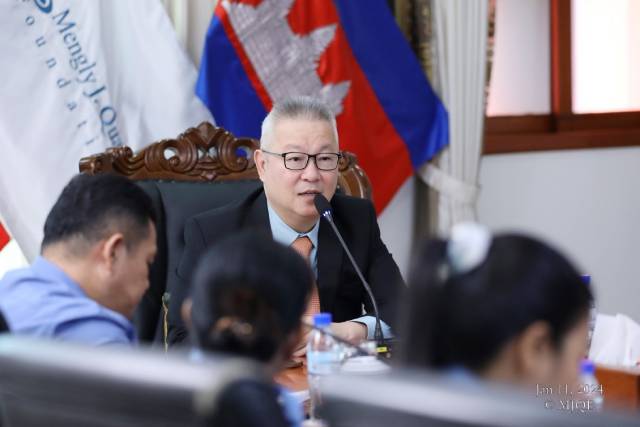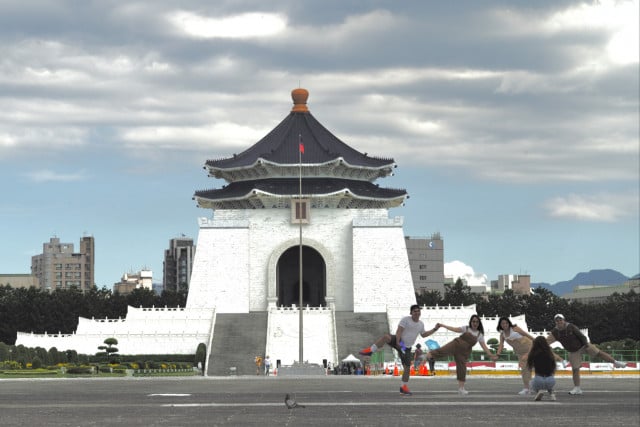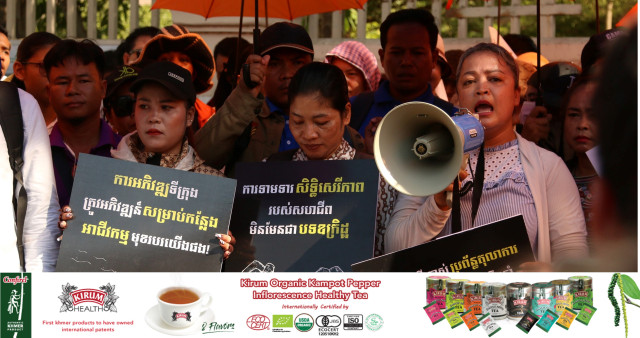Getting a Job While Studying: The Good, the Bad and the Money

- By Nhor Sokhoeurn
- January 17, 2024 9:50 AM
PHNOM PENH – Thanaknuth is a full-time barista at Starbucks and a four-year student at the National University of Management. Since he started higher education, he has been having side jobs to earn money and professional experience while gaining academic training.
“Working while studying gives me a chance to gain experience from a workplace and [be part of] society,” said the 22-year-old student, who already has experience in three different companies.
Before working at the Phnom Penh airport, he was previously an assistant store manager at Domino’s Pizza and a pizza maker.
Thanaknut said these jobs gave him a lot of experience, helped improve his working standards and allowed him to be better at communicating with people.
“I know how to solve problems, manage different types of people, divide work according to their abilities, know how to take inventory, and know how to work in the office,” he said.
 Kongran Thanaknuth (R) is a full-time barista at Starbucks and a four-year student at the National University of Management. Photo provided
Kongran Thanaknuth (R) is a full-time barista at Starbucks and a four-year student at the National University of Management. Photo providedBut the student, who is from Svay Rieng province, acknowledges that work is taking him a lot of time and energy. He has difficulties meeting his university deadlines and lacks time to rest properly.
“I study from 7 to 10 in the morning and then work from 1 p.m. to 10 p.m. including break time,” he said.
“Because of that, I don’t have enough time to rest and do research for my school assignments like other students who focus only on studying.”
If he had to do it again, Thanaknut said he would still choose to work alongside his studies, despite the downsides.
“Working has affected my studies a little bit. Yet I have gained many advantages from my workplace,” he said.
Full-time vs. part-time
Dok Thavy, who graduated from the Royal University of Phnom Penh University in 2023 in Khmer Literature, has also been working for most of her higher education.
At 22 years old, she has been an assistant store manager at a pizza store in the Pochentong area for nearly two years.
But her professional life started even sooner, when she was a first-year student. While she understands that students need to finance their studies, she advises finding the right balance between courses and the need for money.
“Students can work but must avoid taking a full-time job. A part-time job is a better option to preserve one’s energy and studies,” she said.
“Having a full-time job while pursuing higher education only leads to exhaustion and lack of focus in class.”
Before COVID-19, Thavy used to work as a teacher in a school in Phnom Penh to make ends meet. Her occupation supported her living in Phnom Penh and saved money from her family.
Mengly J. Quach, an expert on education and social development encouraged students to work while studying as working helps them gain experience.
But he doesn’t recommend working for the first year at university.
“When you are a first-year student at university, you should focus on studying to hold the foundation firmly,” he said.
“Then in the second year, you can start working or find an internship to help you gain experience,” he added.
 Mengly J. Quach, an expert on education and social development encouraged students to work while studying as working helps them gain experience. Photo provided
Mengly J. Quach, an expert on education and social development encouraged students to work while studying as working helps them gain experience. Photo providedHe said that for many families, working while studying is the only option for bearing the cost of education, which in addition to tuition fees includes rent, food and clothing.
“It is okay if you study in major A and then you work in sector B because studying at university for four years allows you to meet hundreds of students from many provinces, read hundreds of books, grab knowledge from lectures or professors, learn about society,” he said.
But Hout Sokunthea, a lecturer at the Royal University of Phnom Penh, said that if students have no choice but to work to finance their studies, they should at least find a job related to their major, so that they gain useful professional experience.
“If students study architecture but work as a barista, that work only helps them earn money. They cannot earn experience on their major at university and they will likely don’t have enough time to study,” he said.
“But if students work in a sector related to their major at university, they will see the realization of their academic knowledge directly,” he added. “At the end of the day, they will be able to draw on this experience to find a job in the future.”















